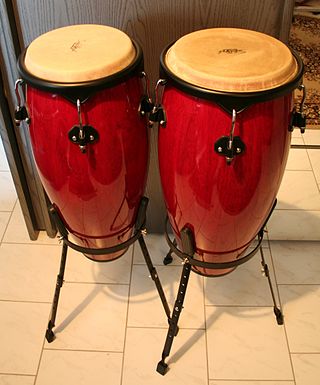
Salsa music is a style of Latin American music, combining elements of Cuban, Puerto Rican, and American influences. Because most of the basic musical components predate the labeling of salsa, there have been many controversies regarding its origin. Most songs considered as salsa are primarily based on Son montuno and Son Cubano, with elements of Guaracha, Cha-cha-chá, Danzón, Descarga, Bolero, Guajira, Rumba, mambo, Jazz, Funk, R&B, rock, Bomba, and plena. All of these elements are adapted to fit the basic Son montuno template when performed within the context of salsa.

Héctor Juan Pérez Martínez, better known as Héctor Lavoe, was a Puerto Rican salsa singer. Lavoe is considered to be possibly the best and most important singer and interpreter in the history of salsa music because he helped to establish the popularity of this musical genre in the decades of 1960s, 1970s and 1980s. His personality, style and the qualities of his voice led him to a successful artistic career in the whole field of Latin music and salsa during the 1970s and 1980s. The cleanness and brightness of his voice, coupled with impeccable diction and the ability to sing long and fast phrases with total naturalness, made him one of the favorite singers of the Latin public.

Arturo Alfonso Schomburg, was a historian, writer, collector, and activist. He also wrote many books. Schomburg was a Puerto Rican of African and German descent. He moved to the United States in 1891, where he researched and raised awareness of the contributions that Afro-Latin Americans and African Americans have made to society. He was an important intellectual figure in the Harlem Renaissance. Over the years, he collected literature, art, slave narratives, and other materials of African history, which were purchased to become the basis of the Schomburg Center for Research in Black Culture, named in his honor, at the New York Public Library (NYPL) branch in Harlem.
Félix Manuel "Bobby" Rodríguez Capó was a Puerto Rican singer and songwriter. He usually combined ballads with classical music and was deeply involved in Puerto Rican folk elements and even Andalusian music, as to produce many memorable Latino pop songs which featured elaborate, dramatic lyrics.

El Gran Combo de Puerto Rico, commonly known as El Gran Combo, is a Puerto Rican salsa orchestra based in San Juan, Puerto Rico. Celebrating its 50th anniversary in 2012, it was often considered Puerto Rico's most successful musical group. The group received the moniker La Universidad de la Salsa in Colombia, due to the sheer number of famous salsa musicians and singers who developed their careers with it, who started with the group, or who were occasionally backed up by the band and La India.

Pedro Ortiz Dávila, better known as Davilita, was a popular Puerto Rican singer of boleros and patriotic songs. He was the first artist to record the Rafael Hernández standard "Lamento Borincano".
Carlos Manuel "Charlie" Palmieri was a Puerto Rican bandleader and musical director of salsa music. He was known as the "Giant of the Keyboards".

Eddie Palmieri is an American Grammy Award-winning pianist, bandleader, musician, and composer of Puerto Rican ancestry. He is the founder of the bands La Perfecta, La Perfecta II, and Harlem River Drive.

Cheo Feliciano was a Puerto Rican singer and composer of salsa and bolero music. Feliciano was the owner of a recording company called "Coche Records". He was the first tropical singer to perform at the "Amira de la Rosa Theater" in Barranquilla, Colombia, and in 1987 he played the role of Roberto Clemente's father in the musical Clemente.
John Madansky, known as Johnny Blitz, is a punk rock drummer from Cleveland, Ohio, best known as being a member of the bands Dead Boys and Rocket From The Tombs. With the Dead Boys he helped pioneer the punk rock sound, look and attitude of the mid to late 1970s.

Tito Gómez was a Puerto Rican salsa singer.
Juan Carlos Quintero Herencia], born in Santurce, Puerto Rico in 1963, is a literary voice from the Puerto Rican literary scene. Member and co-editor of the Poetry journal Filo de juego (1982–1987) the Instituto de Cultura Puertorriqueña published, in 2002, his early poetry under a volume entitled El hilo para el marisco/Cuaderno de los envíos (2002). This volume received the Puerto Rican Pen Club Poetry Prize in 2004. Quintero Herencia has published other collections of poetry such as La caja negra and Libro del sigiloso. Quintero Herencia's poetry is complex and contains an intense desire for experimentation and baroque imagery. In Quintero's recent poetry a concern for the specific nature of the political gesture of poetry is a recurrent topic. As an essayist Quintero-Herencia established himself with Fulguración del espacio: Letras e imaginario institucional de la Revolución cubana (1960–1971), a contextual and critical reading of the crucial debates which defined the Cuban intellectual field during the 1960s. His second book, La máquina de la salsa: Tránsitos del sabor has been hailed by Puerto Rican critics as the most comprehensive critical balance on the Salsa phenomenon. As a Professor, Quintero-Herencia teaches undergraduate and graduate courses in Latin American and Caribbean literatures and cultures at the University of Maryland College Park(United States). He also teaches Literary Theory. Before going to the University of Maryland, he taught at the University of Puerto Rico, Río Piedras and Brown University.

The Jewish immigration to Puerto Rico began in the 15th century with the arrival of the anusim who accompanied Christopher Columbus on his second voyage. An open Jewish community did not flourish in the colony because Judaism was prohibited by the Spanish Inquisition. However, many migrated to mountainous parts of the island, far from the central power of San Juan, and continued to self-identify as Jews and practice Crypto-Judaism.
Jimmy Sabater was an American musician of Puerto Rican ancestry. A three-time winner of the ACE Awards, he was a singer and timbales player. He gained international fame thanks to his work with the Joe Cuba Sextet in the 1960s and '70s, and later became the lead singer of various groups including Charlie Palmieri's Combo Gigante. His son, Jimmy Sabater Jr., is a trumpeter and bandleader.
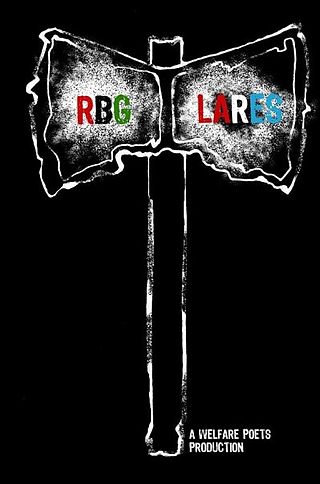
The Welfare Poets are an Afro-Caribbean hip hop group that began to come into fruition up at Cornell University in the early 1990s, but it wasn't until around 1997 when Ray Ramirez and Hector Rivera were back from college and Dahu Ala was also back home that the group began to perform locally and move towards the recording of a first album. The group has toured the United States, Puerto Rico, South America, across Europe and even part of the arctic circle (Iceland). The group plays Hip Hop with a fusion of Jazz and various styles from the Caribbean, including Puerto Rico, Cuba and Jamaica. The Welfare Poets' music is complemented with lyrical content concerning social, political, economical and ecological issues which has made the group relevant over the years. The band released their first studio album "Project Blues" in June 2000 to critical acclaim and then followed up in 2005 with the genre bending and thought provoking album "Rhymes For Treason" which gave the world "Sak Pase", "Freedom", and "The Media". In 2009 they released a tour de force entitled "Warn Them", an epic 16 song opus which brought the group back to their hip hop roots
Vitín Avilés was a Puerto Rican singer, Born in the Barrio San Silvestre of Mayagüez. He learned from his father the Barber job, while he was singing his first gigs in amateur radio shows. In 1943 started as a lead singer on the Orquesta Hatuey of William Manzano and with the Orquesta Anacaona. In 1944 he went to San Juan, Puerto Rico to sing with the Orquesta of Miguelito Miranda on where he recorded his first album. who in the 1940s and 1950s often went unnoticed, even though he was among Latin music's five most popular band singers during the period. He sang in Tito Puente's orchestra and was lead vocals on the hit single Ran Kan Kan. He also sang with Tito Rodríguez, Carlos Varela (bandleader), with his own orchestra, and for Charlie Palmieri. He died January 1, 2004 at St. Vincent's Hospital, in Manhattan, New York.
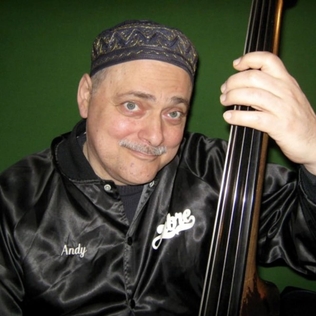
Andy González was a jazz double bassist of Puerto Rican descent recognized as was one of the innovators of Latin Jazz."González was a versatile player, as well as an arranger, composer, music historian and producer of other musicians’ records. He embraced African, Cuban and Puerto Rican styles, various strains of jazz and other influences, often merging them into something fresh." Raised in the Bronx, he played violin in grammar school and later picked up the bass after taking lessons with jazz bassist Steve Swallow from 5th to 8th grade, thereafter he attended the High School of Music & Art. "Swallow turned Gonzalez on to Pablo Casals and Scott Lafaro, wrote out the second movement of the Bach Cello Suite in D minor, and helped Gonzalez prepare for his audition at Music and Art." "Andy González came to the public's attention playing for future NEA Jazz Master Ray Barretto's band, while he was still a student at Music & Art High School. Although it was a salsa group in the Cuban conjunto trumpet tradition, Barretto treated the group like a jazz combo, featuring all the players as soloists." While at Music & Art High School, he "play[ed] with other classmates such as Mongo Santamaria's son, Monguito, Jose Mangual Jr., Rene Mcclean, Onaje Allen Gumbs, Stafford Osborne, Nelson Samafiego, a Puerto Rican alto saxophonist, DJ Cousin Brucie, Eric Bibb, Wilbur Bascomb(son of Ted Bascomb, bassist for Erskine Hawkins), Allison Dean, and Janis Ian, who was in his homeroom and dropped out sophomore year just after recording 'Society's Child.'
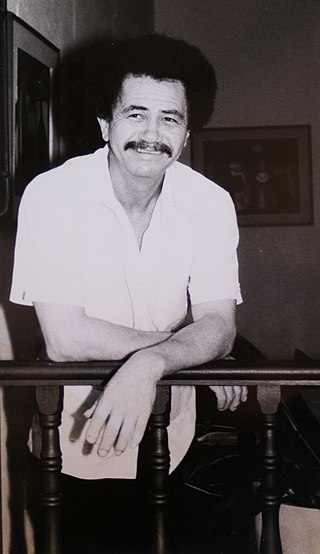
Félix Rodríguez Báez, was a Puerto Rican painter, artist, graphic designer, set designer, cartoonist and art teacher.
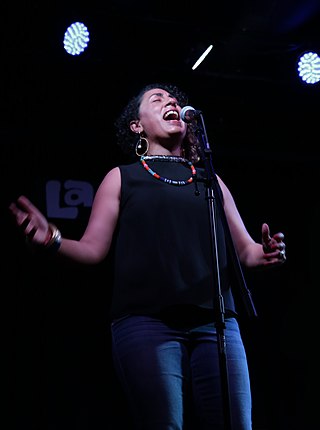
Taína Asili is an American musician, singer, songwriter, poet, artist and activist. Born in Binghamton, New York to Puerto Rican parents, she first came to prominence in the late 1990s as the singer for the punk band Anti-Product, and later for her social justice themed music with the band Taina Asili y la Banda Rebelde. Asili’s musical career has spanned genres as diverse as Afro-Caribbean music, flamenco, hardcore punk and opera, and her art is driven by her work on prisoner justice, climate justice and food justice.












